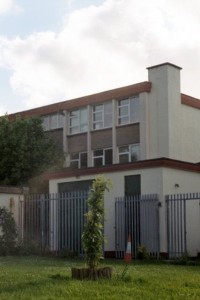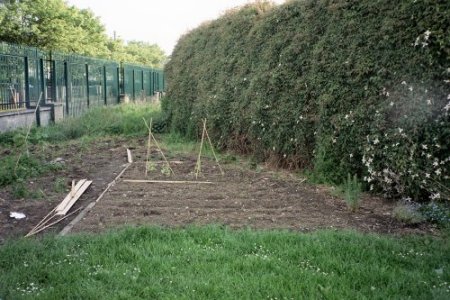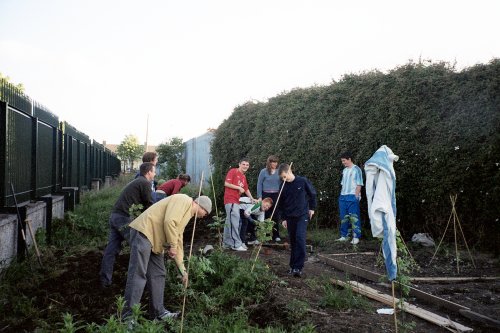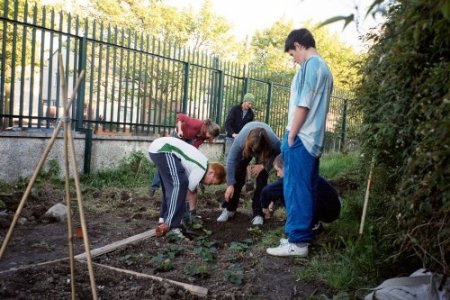|
Blog Feeds
Public InquiryInterested in maladministration. Estd. 2005
Human Rights in IrelandIndymedia Ireland is a volunteer-run non-commercial open publishing website for local and international news, opinion & analysis, press releases and events. Its main objective is to enable the public to participate in reporting and analysis of the news and other important events and aspects of our daily lives and thereby give a voice to people.
Lockdown Skeptics
Voltaire NetworkVoltaire, international edition
|
Finglas Community Garden dublin |
environment |
feature dublin |
environment |
feature
 Friday June 02, 2006 20:22 Friday June 02, 2006 20:22 by Paul Baynes by Paul Baynes
 A new community garden has been opened in Finglas. The garden is in the grounds of St. Joseph’s National School for girls, on Barry Avenue in West Finglas (map). Like other community gardens that have been set up in Dublin in the past year, in Phibsborough and Dolphin’s Barn, this project has an environmental focus, with the intention of establishing a system of urban food production on a small scale. The gardeners also hope to play a small part in strengthening the cohesion of the local community, by inviting the involvement of local people in the project. As global supplies of oil become depleted, urban food production is likely to become more and more important in the future. Cuba was forced to turn to urban food production following the dissolution of the Soviet Union in December 1991, when Cuban oil supplies dropped from 30 million tones to just 4 million tonnes. Today, 50% of Havana’s food comes from urban gardens and allotments. The garden came about after one of the teachers in St. Joseph’s school met Lara, a Dolphin’s Barn community gardener living in Finglas, through the Catholic Worker community in Rialto. With the agreement of the school authorities, she offered an area of the school grounds as the basis to start a new community garden for Dublin city. A number of gardeners, for the most part from the garden in Dolphin’s Barn, have been working in the school over the last month or so, preparing the ground and planting strawberries, lettuce, beans, squash, rocket, rhubarb, and a few sunflowers.
The soil in the Finglas garden is a lot stonier than that in Dolphin’s Barn, and some of the Finglas crop has been attacked and eaten by slugs. But the gardeners are persevering, and the garden is coming into shape. There is an arrangement to meet at the school every Wednesday evening. Last Wednesday, which was a fine, dry day, there were seven of us working on the garden, when curiosity brought a group of four young local lads into the school to see what was going on. They were on their way for a game of cards, but dropped in to ask all about the project. They ended up promising to come back the following week to help out. Anto (in red) and his friends can be seen in the photos below.
As well as making links within the community, there are plans to create a national network of community gardening projects. A few weeks ago, in County Clare, there was a meeting of community gardeners from all over the country. This meeting included a screening of the film The Power Of Community – How Cuba Survived Peak Oil, about how urban sites of food production have become particularly important in Cuba. One of the main points of discussion at the meeting was the best way to establish links between community gardening groups nationwide. Irish community gardeners have also begun to make links with other projects outside of Ireland. One of the gardeners in Dublin, Bruno, was involved in community gardening in France for about five years, and was part of a nationwide community gardening network. He is returning to France at the end of the summer and is to report back to the French network on the state of community gardening in Ireland.
The Dolphin’s Barn garden is closed for the moment, but the considerable energy that has been built up will not be wasted: friendships made in Dolphin’s Barn are being maintained, and the knowledge that was accumulated will be applied to the Finglas garden. In Dolphin’s Barn, there were some efforts made to connect with the local community. These included an exhibition in the public library, and an initial foray into environmental education. In conjunction with Nancy from ECO-UNESCO, residents of Dolphin's Barn and Rialto, Kieran Kirwan and Ciaran O’Byrne, who became involved with the garden last summer, gave a talk in a National School in nearby Basin Lane about the project. They left the school with a few blueberry plants. In Finglas, because of the link with the National School, the potential for community involvement may be even greater.
Community gardeners in Finglas have already been in contact with Dublin City Council’s local community development officer, who has been very encouraging about the project. There is a large waiting list for allotments in the Fingal district, and the gardeners hope to get in touch with people from the waiting list, to invite them to get involved in the Finglas Community Garden. Last Wednesday, 31st May, the City Council had a plant sale in the school from 6-8pm, and Finglas community gardeners gave out some leaflets and made some contact with local people. Again a group of local youngsters came down and helped us clear a large area of grass. The garden was also visited by Alma, a research student in Oxford Brookes University, who is studying urban food production, and examining the relationship between green spaces and human well-being.
An email address for queries has been set up, but for the moment, the Finglas group are working from the Dolphin’s Barn garden e-mail discussion list. However, in June a separate mailing list for the Finglas garden will be created. Watch this space for further details. Any like-minded individuals or groups are welcome to get involved. The group already has an overlap in membership - or has made links - with groups such as the Cultivate Centre for Sustainable Living, the Dublin Food Co-op, Food Not Bombs, Seed Savers, and the Rialto Environment Network. If you are interested in local, urban food production as an alternative to food characterised by the three ‘p’s (pesticides, preservatives and excess packaging), you can get in touch with a community gardening project in Dublin at one of the email addresses below. You’ll find that there are plenty of other people taking action to cut down on food miles and unfair trade.
finglasgarden@gmail.com dolphinsbarngarden@gmail.com |


























 printable version
printable version

 Digg this
Digg this del.icio.us
del.icio.us Furl
Furl Reddit
Reddit Technorati
Technorati Facebook
Facebook Gab
Gab Twitter
Twitter
View Comments Titles Only
save preference
Comments (4 of 4)
Jump To Comment: 4 3 2 1just back from one of the best weekends ever in rossport - amazing place, pure untouched beauty. the solidarity camp is a near perfect example of sustainable living - low tek, low impact buildings, grey water systems, compost systems, full recycling - the only thing thats missing from the loop is the food production, and they have been offered a space to grow food in a nearby hostel, so who knows....
theres a little story brewing about how strange and magical things happened in the past on a little island....
so who knows.... theres a lot of lovely things happening here at present, who knows what it will lead to.
thanks to one and all for creativity, vision, dreaming, hard work, communicating, trying.
It is possible to take both the 40 and the 40A buses from Parnell Street directly to the Finglas Community Garden. Just get off the bus at Barry Road near the Cappagh House pub. St. Joseph's Girls' School is on the right on Barry Avenue.
I've met some of the community gardners though the Catholic Worker and am delighted to read of the expansion of this idea. I'm sure it's really great for the kids in the school as well. Well done to everyone who does this important, ongoing work.
As the teacher who invited the community gardening group to become involved, I wish to say that for me their involvement is a dream come true. In recent years a colleague and I have dedicated many after school hours to developing previously non-existent flower-beds. We involved other teachers and children from most other classes in planting bulbs and flowering plants during school hours. Weeding is a nightmare and pupil involvement in this activity has been very limited and sporadic.
Trees donated to us for the millennium year were initially planted outside the inner fenced area. They had to be transplanted inside the inner fence area as over night some of them were damaged. Eventually the other perimeter of the school was fenced properly. Parents paid for some flowering trees to be planted on two of the three outer front lawns. The trees on the third lawn, near the community garden area, were specially planted in memory of a recently deceased teacher and a six-year old pupil who also died.
Dublin City Council gave us around 50 native tree saplings two years ago. Tree Walk members arrived on a bicycle one day and offered to plant 20 native trees with a group of children. All these new trees were planted near what is now the community gardening area. However the ground was never properly dug around the trees. Part of the ground around some of these trees has been now cleared by the community gardening group, which is wonderful. The trees will have a better chance of thriving. Weeds took over the entire area around all these saplings last year and had to be strimmed. Competing with so many weeds cannot be a help to the new young trees. Local residents also complained about what they considered the unsightly appearance of this area of the school grounds.
Several oak seedlings grown from acorns, and holly seedlings, grown from berries, have been planted elsewhere in the school grounds. Lilac trees have also been planted. Though not native plants, they are easily propagated from existing trees and their scented purple fragrance and flower are beautiful in May. Should anyone have a white lilac tree, perhaps they would donate a rooted section of it to the school for propagating. Some elderberry trees, which thanks to bird droppings, have self-seeded here and there.
Slugs and Snails
Lara mentioned the difficulty of enabling their young vegetables to survive the onslaught of slugs and snails. I apologize to the group for exposing them to this problem! Snails are also very partial to sunflowers. They climb up the stalks and rapidly decapitate them. The more developed they are before transplanting them into the open, the better. Surrounding them initially with a barrier of grit and baked eggshells is a help, but is not fool-proof. Incidentally, if collecting eggshells, rinse them initially, store until there are enough to fill a baking tray, and crunch them up small before and after baking. Diluted stale beer traps are also a help. It is said that if slugs and snails are put into compost bins they are happy to stay there. Whether this is a fool-proof way of compounding them, I am not sure. I used to collect them and dump them under a hedgerow elsewhere. However, as they live under the cracks in the car-park, under various other objects here and there, and under the nearby clematis, even a major snail-gathering blitz on a wet day/evening, would not totally solve the problem. The smaller ones would go undetected and eggs laid in soil would still hatch. Using slug pellets could endanger the birds. The sparrows, which frequent the hanging curtain of clematis on the nearby railings, are already an endangered species, due to the thinning of their eggshells, possibly due to traffic pollution.
I am delighted, too, that you have managed to attract some local young people to assist you. That too, is a dream coming true. The area, which has been offered to the community gardening group, has been classified as the “wilderness”. Locals used to dump unwanted articles there before the outer railings were in place. Digging it is a mammoth task. I am very grateful to you for undertaking to clear it, dig it and plant vegetables in it.